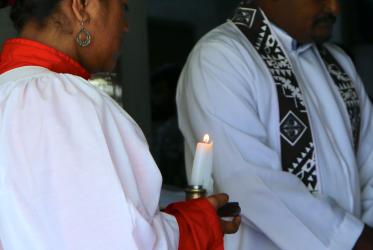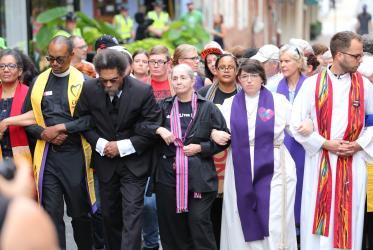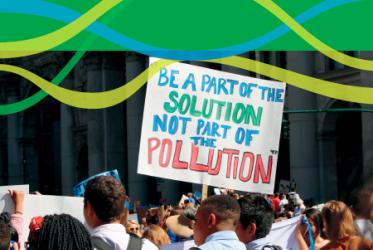November 30-December 3, 1999
Seattle, Washington, USA
Geneva, October 1999
A. Globalization and the World Trade Organization (WTO)
The accelerated process of economic globalization transformed and changed the economic and political landscape of the old international paradigm put into place after World War II. In retrospect, the debt crisis became a tool for the financial institutions to intervene in the economic and financial policies of national governments. Structural adjustment and stabilization programmes (SAP?s) were designed and imposed by the International Monetary Fund (IMF). This was done in accordance to the principles of the neo-liberal ideology.
Structural Adjustment Programmes in combination with liberalization and the deregulation of international trade, investment and finances have adversely affected the lives of millions of people in the South. The majority of people have become poorer, the environmental resources more depleted and destroyed. Communities of the poor and marginalized and nature in many ways has had to pay the price and continues to suffer. Even entire nations were pushed into a downward spiral of impoverishment, especially in Sub-Saharan Africa.
Individual governments and societies, but also the funds, programmes and agencies of the United Nations system, have lost out against economically powerful actors, advocating for trade liberalization and de-regulation of international trade and the transnational flow of capital. The World Trade Organization, that developed out of the old GATT as a result of the Uruguay round in 1994, provides a new instrument to implement the free trade agenda.
After five years experience of the WTO, it has become clear that the starting point for many of the decisions is not, as often assumed and stated by the organization itself, a fair and equal position of the various actors involved. The recipes for trade liberalization deepen inequalities and allow transnational corporations to grow disproportionately to the disadvantage of less powerful actors. The discontent about the inequalities and imbalances is growing. Governments in the global South and many civil society groups call for a review of WTO treaties and rules. Industrialized countries, however, want to further accelerate the process of trade liberalization and expand the powers of the WTO.
The decisive question in the preparatory process for the Ministerial Round of the WTO is whether there should be an expansion of the role and influence of the WTO or a moratorium for new issues on the agenda of the WTO until many of the imbalances and conflicts around WTO agreements and procedures are resolved.
B. Imbalances and conflicts
The WTO and the UN System
We live in a world with a global economy and yet political decision-making is at the national level. This is giving rise to increased demands for global governance, yet there is no participatory and life-enhancing approach to creating global institutions. At the global level we are witnessing a power shift to those institutions where the economic interests of the rich industrialized world are strengthened and protected.
The power invested in the WTO not only overshadows that of other global institutions of the UN system, but its decisions can also over-ride their jurisdiction and mandates, in some cases overturning years of careful and more participatory deliberations and hard won principles.
The area of ecology
The United Nations Conference on Environment and Development (UNCED), for example, established three over-arching principles that are in conflict with some of the WTO criteria and principles:
- the precautionary principle conflicts with the sound evidence criteria of the Sanitary and Phytosanitary Agreement (SPS) of the WTO - a recent example was the ruling of the WTO's Appellate Body against the European Union's import ban on beef treated with growth hormones;
- the internalization principle with the decoupling criteria of the Agreement on Agriculture;
- and the polluter pays principle with the Process and Producti
Bio-diversity, climate change and intellectual property There is growing awareness about the contradictions and tensions between WTO rules and the Multilateral Environmental Agreements such as, for example, the United Nations Convention on Biodiversity (CBD) or the United Nations Framework Convention on Climate Change (UNFCCC):
- At the inter-sessional meeting of the Parties to the Biodiversity Convention, in June 1999 in Montreal, potential conflicts between the CBD and the WTO Agreement on Trade Related Intellectual Property Rights (TRIPs) were discussed. Intellectual Property rights became a major instrument of, for example, big players in the world?s agribusiness to secure their own profits at the expense of poor communities and their food security. African countries, for example, now realize that the TRIPs Agreement is a threat to local communities and undermines the application of the CBD. Indigenous Peoples representatives are concerned about the lack of protection of traditional indigenous rights in the TRIPs agreement.
- The WCC, many NGOs and most developing nations maintain that it is the responsibility of industrialized countries to meet their emission reduction targets primarily by actions within their own countries and not rely on such external mechanisms as emission trading. One method to ensure this focus on domestic action is to place a cap or limit on the percentage of reduction target that can be met externally. However it appears that such a cap would be viewed as illegal under WTO rules because it would be considered a non-tariff barrier to trade. This could also apply to domestic measures such as standards or incentive programmes that favored a switch to clean air renewable energy sources as opposed to fossil fuels.
Threats to forestryIf attempts to introduce a Global Free Logging Agreement will be successful, consumption of paper and other wood products would increase by 3-4%. Efforts to protect what is left of the world's forests in the follow-up process to UNCED (Rio de Janeiro, 1992) would be further weakened and undermined.
While the WTO is required to collaborate with the International Monetary Fund and the World Bank, it makes appropriate arrangements with the Multilateral Environmental Agreements and the rest of the UN system and co-operate with them only as it sees fit (art. III, 5 and V,1 of the WTO constitution).
This imbalance in the development of global governance places the trade and finance institutions in a pre-eminent position and gives these interests dominance in global governance and disempowers those institutions working for human rights, sustainability and social justice. The UN Sub-Commission on the Promotion and Protection of Human Rights has repeatedly expressed its concern about the impact of trade liberalization on human rights.
The Multilateral Agreement on Investment (MAI) was derailed in the Organization for Economic Cooperation and Development (OECD) last year by worldwide protests. There are now attempts to revive the MAI within the WTO. It would give special powers to transnational corporations and make it very difficult to establish human rights, and social and environmental standards as criteria for investors. There are now attempts to revive the MAI within the WTO and thus deepen this conflict.
The WTO and Developing Countries
The WTO is based on the two assumptions that everybody benefits if the efficiency of production improves and that every country should concentrate on those sectors and products where it has a comparative advantage. Taking those assumptions as a starting point, the WTO has advocated open markets and free trade. However, developing countries in many cases have lost more than they have gained.
The promise that liberalized agricultural trade would increase food output and lead to a better deal for farmers has proved to be an illusion for millions of small farmers. Trade liberalization has a bias towards larger food producers and transnational corporations (TNC's) active in agribusiness. They concentrate on the production of export crops for lucrative foreign markets. Food security is likely to be a victim of the growth of TNC's in the economy of developing countries.
The treatment of all services as a commodity or enterprise has had devastating effects on the health of the people in many countries. The opening up of the health care industry to TNCs and the stringent implementation of TRIPs have negatively affected health programmes in many countries.
Developing countries find themselves often confronted with results of invisible negotiations between the most powerful actors that they are simply asked to endorse. While in theory the member states work in the WTO on an equal basis in a contractual relationship, in practice some are more equal than others. The topics chosen for negotiation and the details of agreements, are displaying a bias against the development of developing countries, while supporting the interests of highly industrialized countries. This is clearly shown by the difference in the treatment of sectors and products of interest to developing and developed countries. An example of this is the implementation of the WTO Agreement on Textiles and Clothing that delays expected benefits to developing countries.
It is also very difficult for many developing countries to accompany and follow the many meetings of informal negotiations that take place almost every day at the WTO in Geneva. Many countries are not represented at all while the rich countries have a huge number of experts and specialized staff at their disposal.
These imbalances and conflicts exist not just by accident. They are an expression of the existing global power relationships, the lack of political will to develop a participatory and life-enhancing approach to global governance, and the dominance of the prevailing economic paradigm.
C. Making the WTO accountable
Unfettered economic growth is the overall macroeconomic goal, overriding all other concerns of societies. It is the agenda of the unaccountable powers of the transnational corporations, the major benefiters and actors in this rule setting. People's movements are disempowered by the shift of decision making, further away from people, to an abstract rule-based system and far-away bureaucracies, from local control over resources and the means of survival to complex vulnerable and intangible forces of global competition.
The WTO needs to
- make its own structures more accountable,
- make trade more instrumental to serve values of societies like equity, sustainability, justice and participation,
- balance the goal of free trade adequately with non-trade concerns, like human rights, gender issues, cultural diversity, health, food security, ecology or animal welfare,
- check the power concentration in the hands of the few global players, such as the G7 governments or the transnational corporations.
It is not enough to correct the present rules by granting some exceptions here and there, with safeguards or differential/preferential treatment, as long as the aggressive increase of the free trade agenda itself does not accept limits and corrections itself. Trade rules need to protect the more vulnerable economies of developing countries against the more powerful actors so that they grow under stable conditions and trade regimes, benefiting the majority and especially the poor.
Global institutions, in the same way as national governments, have to serve the welfare of all people who have the right to an equitable share of the economic benefits. Global institutions too need to protect and support the interests of the poor and marginalized. It is imperative that their proceedings be put under scrutiny and rendered transparent. The following questions point to those yardsticks for a more accountable WTO:
- Whose interests does it serve primarily? Who benefits?
- For whom does it use its power of protection and enforcement?
- Is the process of negotiations and policy making sensitive to the voice of the poor, less developed yet most affected nations and peoples?
- To which extent are the WTO agreements coherent, complementary and
- Are the policies, strategies and proceedings available and transparent for information sharing, scrutiny and collective critique?
D. Steps taken by the WCC
The Justice, Peace, Creation team of the WCC has shared information on the WTO and the forthcoming negotiations with WCC member churches and ecumenical partners through a Dossier on Globalization and Debt and the issue 15/1999 of the ECHOES magazine.
The ECHOES magazine includes the following articles that are of relevance for the concerns raised in this background document:
- From the MAI to the Millennium Round by Susan George
- TRIPs, Traps or Dice? Gambling with World Food Security by RAFI (Rural Advancement Foundation International)
- TRIPs and its potential impacts on Indigenous Peoples by Victoria Tauli-Corpuz
- TRIPs and Pharmaceuticals by Eva Ombaka
The WCC hosted a meeting on WTO and Agriculture in June 1999, which provided a platform for farmer's organizations and church related groups and agencies to address the review of the Agreement on Agriculture. This meeting was preceded by an international conference organized by The Association of World Council of Churches Related Development Organisations In Europe (APRODEV). APRODEV published a collection of case studies that was edited by John Madeley: "Trade and the Hungry. How international trade is causing hunger." Requests for this collection can be made through [email protected].)
The WCC will also sponsor a meeting in October in Geneva to continue the debate on TRIPs among Indigenous Peoples.
The meeting of the WCC Central Committee in September 1999 in Geneva included an informative discussion on the WTO with representatives of Permanent Missions of developing countries in Geneva. The Central Committee responded with a call to share information on the WTO with WCC member churches and raise awareness for the implications of the forthcoming WTO Ministerial Round in Seattle. This background document will be sent to member churches together with concrete proposals regarding the negotiations in Seattle.
Many of the WCC member churches, church related agencies and ecumenical groups are working on the impact of international trade on the life of people and monitor the WTO. Many of them will also send their representatives to Seattle. The WCC intends to provide a meeting place for them in co-operation with local partners and US member churches. The meeting in Seattle is an opportunity for partners in the ecumenical movement to recognize each other and intensify the co-operation.



